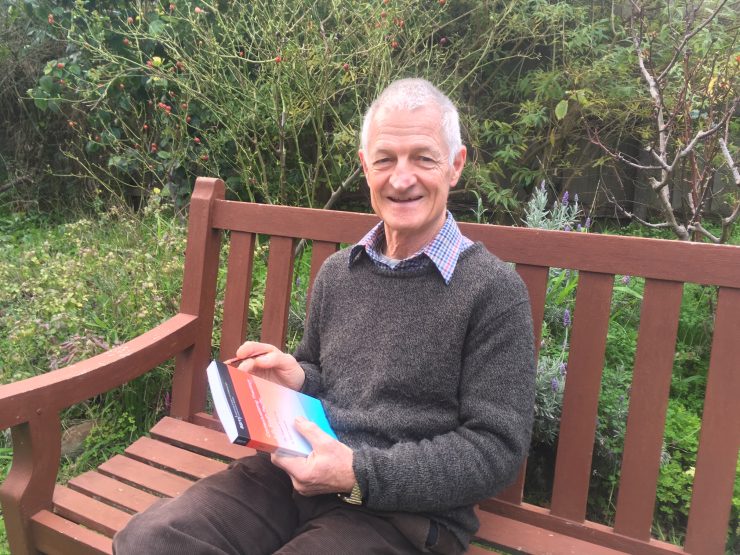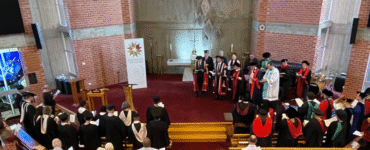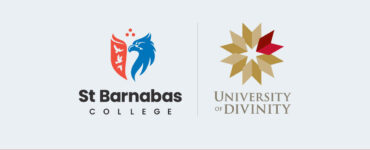Congratulations to Dr Randall Prior, on the publication of his PhD thesis by the American Society of Missiology in their monograph series.
Dr Prior is an alumnus of the University of Divinity, having graduated with a Doctor of Philosophy in 2017. His thesis, Contextualising Theology in the South Pacific With Lessons Learned from The “Gospel and Culture in Vanuatu” Project was supervised by the Reverend Dr Lawrence Nemer.
Dr Prior is currently a member of associate faculty at Pilgrim Theological College within the University of Divinity in Melbourne. During five years of ministry in a newly independent Vanuatu in the 1980s, he became immersed in the issues of the relationship between the Gospel and cultural context. He has pursued that passion for over thirty years. He is the publisher of ten books in the Gospel and Culture in Vanuatu series.
The thesis establishes that the contextualisation of theology in the South Pacific must take account of key factors which profoundly shape its content and methodology. These factors are that South Pacific cultures are oral-based; and that they are defined by Melanesian and not Enlightenment categories. It is argued that the ‘Gospel and Culture in Vanuatu’ project offers a genuine theological model.
Professor John McDowell, Director of Research at the University of Divinity praised the publication, saying:
Randall Prior’s book Contextualizing Theology in the South Pacific is the fruit of considerable experience and research. It provides both a rich resource for understanding the conditions and contexts of theological learning in the South Pacific, and a valuable grounding in the case study on the ‘Gospel and Culture in Vanuatu’ project.
About the publication of his work, Dr Prior said:
The publication of this book marks the end of a long and most unexpected journey that really began in January 1983 when I was appointed to serve in the Presbyterian Church in Vanuatu. It was just after the achievement of independence that brought with it a great sense of national pride, a rejection of all things colonial, and a resurgence of local cultures. The local church was now prioritising its own agenda of the cultural relevance of the Christian Gospel. For me, it was like landing on another planet, certainly into a different world. Rather than continuing the pre-independent missionary agenda, I was expected to work in ‘the Melanesian way’, to adopt the indigenous agenda, and to partner with local leaders.
As a result, I found myself caught up in a generational movement exploring ‘Gospel and Culture in Vanuatu’. At the end of my five years appointment, and now passionately immersed in issues of Gospel and Culture, I began a more serious engagement with the wider issues of contextual theology that were, by then, emerging across the whole theological world. Increasingly, I felt the need for the voice of the South Pacific to be heard in this debate. Over a period of years, and working with the local people in Vanuatu, we began to document and publish the story of how the Gospel is grounded within the unique cultural context of these oral communities. But a deeper question emerged in all of this: what does the pursuit of theology look like in cultures that are essentially oral and communal, and where the presuppositions and parameters of post-Enlightenment literacy-based western cultures simply do not exist?
My unexpected appointment onto the Faculty of the Uniting Church Theological College in 2003 provided the environment and opportunity to tackle this issue within the framework of a doctoral dissertation, requiring me to sharpen my insights, and to articulate the significance of my learning (notably, as required by, and suitable for a literacy-based cultural context).
Successful completion of the doctoral dissertation was, of course, personally satisfying. But for the American Society of Missiology to publish this work in its monograph series has a much greater sense of bringing my journey to a conclusion. It enables a story that deserves to be heard, the Vanuatu Story of Gospel and Culture, to be brought to international ears, it puts into a wider global arena the distinctive account of the contextualisation of theology in the South Pacific, and it enables the pressing but overlooked issues around the nature of theology in oral-based communities to be given voice. These issues are not confined to the South Pacific or to other oral contexts like Africa; they are increasingly pressing wherever people from oral-based communities happen to be ministering and theologising, and that means, in Australian churches and theological colleges.







Add comment